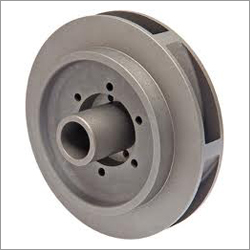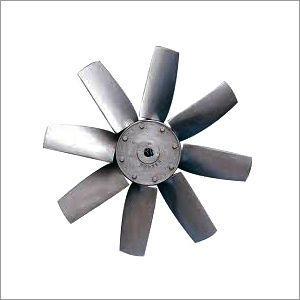Aluminium Alloy Impeller
Product Details:
- Product Type Aluminium Alloy Impeller
- Usage Industrial
- Color Grey
- Size 300mm
- Material Aluminum Alloy
- Click to View more
Aluminium Alloy Impeller Product Specifications
- 300mm
- Grey
- Aluminum Alloy
- Industrial
- Aluminium Alloy Impeller
Aluminium Alloy Impeller Trade Information
- All India
Product Description
Due to their advantageous characteristics, aluminium alloys are frequently used for impellers:
1. Lightweight: Compared to many other materials, aluminium and its alloys are lightweight due to their low density. Applications where weight reduction or rotational efficiency are crucial benefit from this feature.
2. Aluminium alloys are very resistant to corrosion, especially when compared to ferrous materials. They create a shielding oxide layer on the surface, which deters corrosion in a variety of conditions, such as exposure to water or specific chemicals.
3. High strength-to-weight ratio: Aluminium alloys have a high strength-to-weight ratio, which means they enable strong construction at a comparatively light weight. This characteristic lowers the possibility of impeller failure brought on by extreme loads and enables effective fluid handling.
4. Aluminium alloys are noted for their great machinability, making it simpler to shape, cut, and construct them into intricate impeller designs. This characteristic enables manufacturing procedures that are economical.
5. Aluminium alloys' excellent thermal conductivity makes it possible for the impeller to dissipate heat efficiently. In applications where controlling temperature or heat transfer is crucial, this characteristic is especially helpful.
Impellers made of aluminium alloy are frequently employed in a variety of sectors, including the automotive, HVAC, aerospace, water and wastewater treatment, and more. They are appropriate for applications that involve water, air, or low-corrosive fluids and need for lightweight design, corrosion resistance, and effective fluid handling.
The particular aluminium alloy that is utilised for an impeller depends on a number of variables, including the application, fluid properties, working circumstances (temperature, pressure), and any special requirements. Depending on the intended usage, different aluminium alloys can be customised due to differences in strength, corrosion resistance, and other characteristics.
To ensure the best performance and longevity of aluminium alloy impellers in their respective applications, proper design, material selection, and manufacturing procedures should be used.
FAQ
1. What are the advantages of employing an impeller made of an aluminium alloy?
Ans - An impeller made of an aluminium alloy has a lot of advantages, such as being lightweight, durable, and having effective heat transmission qualities. An aluminium alloy impeller is a wonderful option for producing lightweight but powerful components in a range of applications due to its low weight. The exceptional corrosion resistance of aluminium alloy makes it ideal for usage in water and other corrosive, damp environments. The material is suitable for use in hot or cold water systems since it can resist higher temperatures. Impellers made of aluminium alloy also transfer heat more effectively, requiring less energy and costing less to operate.
2. What kinds of uses are there for impellers made of aluminium alloy?
Ans - Impellers made of aluminium alloy are frequently employed in a range of pumps and applications in the light industrial, plumbing, and HVAC industries. They are frequently used to carry liquid and gas in sewage, water and power systems. Additionally, impellers made of aluminium alloy are excellent choices for both hot and cold water systems.
3. What kind of maintenance are aluminium alloy impellers required to undergo?
Ans - Impellers made of aluminium alloy normally need very little maintenance and can run continuously for long periods of time. In most cases, routine cleaning is all that's needed to guarantee peak performance. Additionally, routine cleaning and inspection should be carried out for situations where the impeller is exposed to corrosive liquids to ensure that the material stays in good condition.
4. How do you size an impeller made of an aluminium alloy?
Ans - You must first precisely measure the pump capacity in order to size an impeller made of an aluminium alloy. Once this has been established, you must select an impeller that can handle this capacity. Additionally, the right displacement grade impeller for the needed pressure needs to be chosen.
5. Do aluminium alloy impellers cost more than those made of other materials?
Ans - Compared to plastic, brass, or stainless steel impellers, aluminium alloy impellers are often more expensive. However, they frequently last longer and require less upkeep, which may ultimately make them a more affordable choice. They may also provide higher heat conductivity, which helps save energy consumption in applications that call for high temperatures.

Price:
- 50
- 100
- 200
- 250
- 500
- 1000+



 Send Inquiry
Send Inquiry Send SMS
Send SMS
